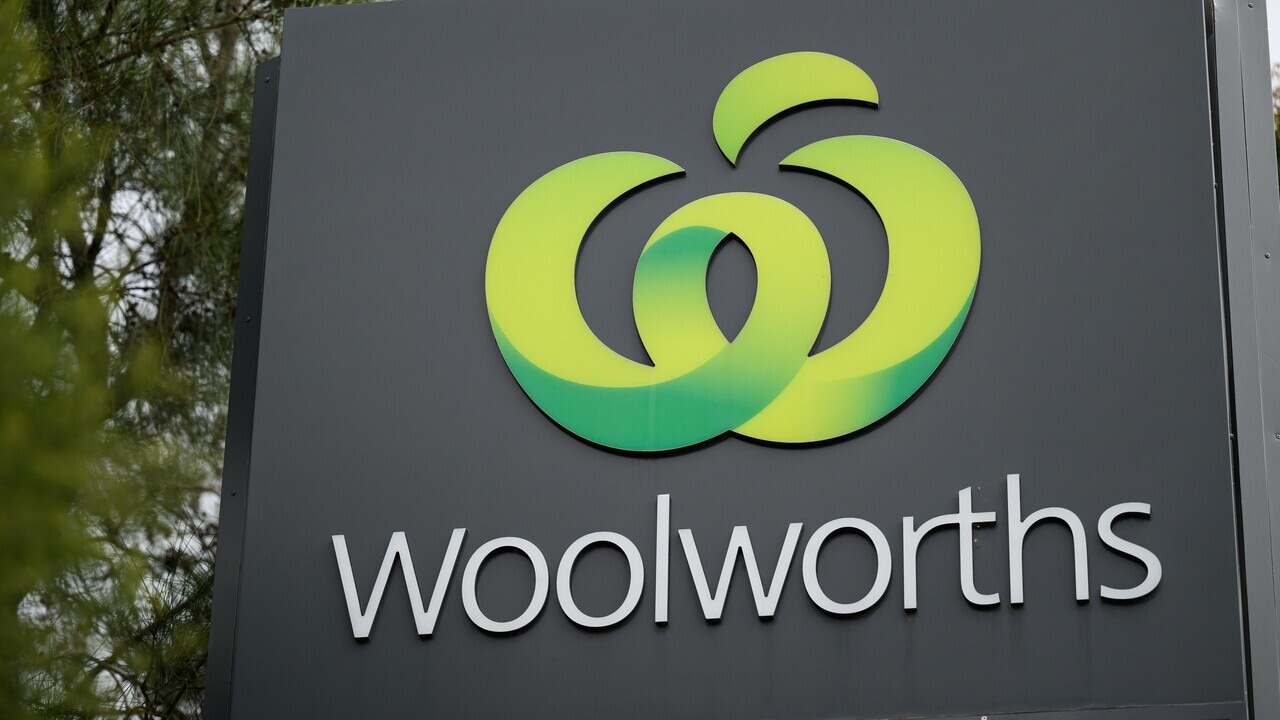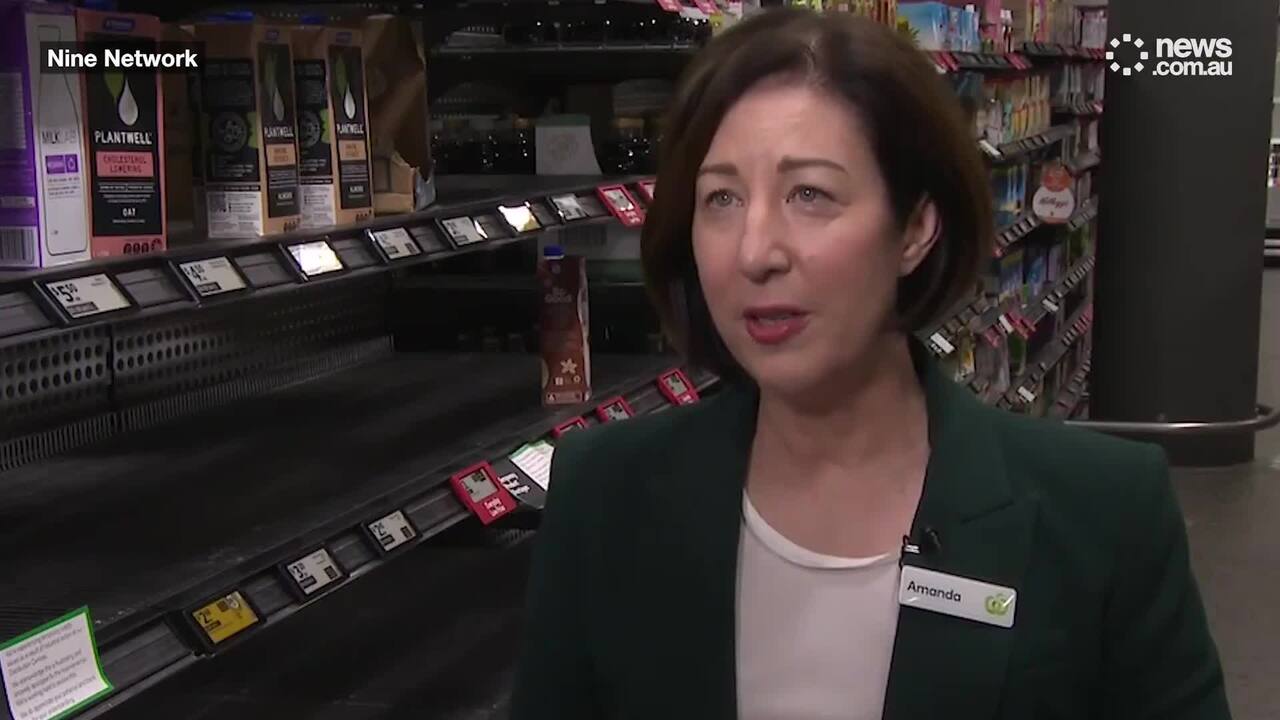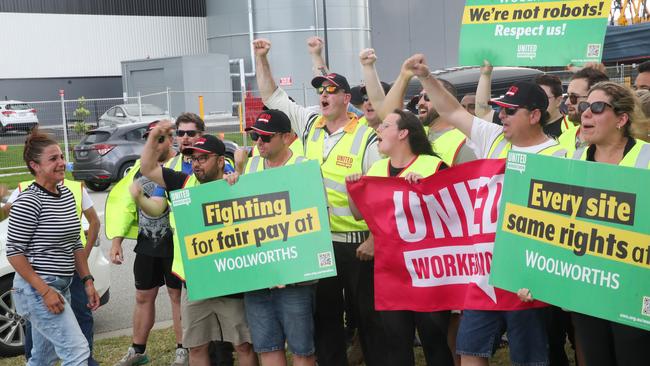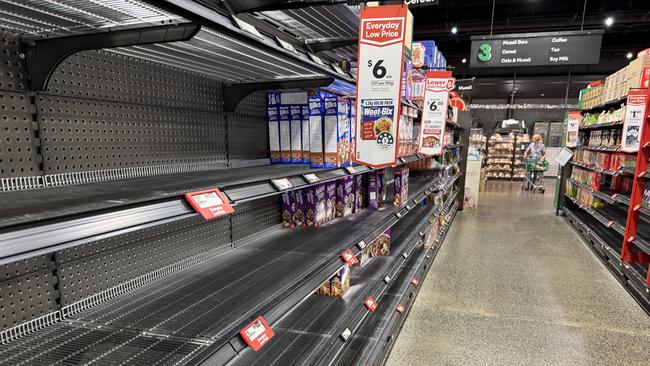Woolworths empty shelves caused by the strike has caused supply headaches for Coles
Coles is ordering more from suppliers and opening extra checkouts as strikes at Woolworths wiped out $140m in sales, delivering a challenge and opportunity to its rival.

Business
Don't miss out on the headlines from Business. Followed categories will be added to My News.
Woolworths is facing a $140m sales blackhole due to the 17 day strike at its distribution centres, up from the initial estimate of $50m in lost sales advised to the market last week, to slice as much as $60m from the earnings of its flagship Australian supermarket division.
It comes as Coles has been forced to ask its food and grocery suppliers to ship more goods to its warehouses and put on more staff to handle the extra volumes as shoppers turn away from Woolworths due to their empty shelves caused by two weeks of strikes and trigger a sales surge at Coles. Coles has also opened more checkouts at its stores to deal with the heightened demand and traffic through its stores as its largest competitor faces supply shortages.
On Monday Woolworths provided an update to the market following a weekend agreement struck between the retailer and the United Workers Union, with the union winning an 11 per cent pay rise for its workers over three years - although this was well short of the initial demand of a 25 per cent wage hike over three years.

Although the industrial unrest is over and Woolworths is now trying to catch up with supplies to replenish its empty shelves, the strikes will leave a lasting mark on its first-half results.
Woolworths said in a statement to the ASX on Monday it anticipated there will be further sales and earnings impacts for its flagship Australian supermarkets in the second quarter, due to the time and effort required to rebuild stock levels at both the distribution centres (DCs) and stores ahead of the busy Christmas trading period.
“The full extent of the one-off financial impact is unknown at this stage,” the retailer said.
Woolworths said that Australian food/supermarket sales had been negatively impacted by approximately $140m in total (up to December 8) with approximately $90m incremental since the previous update on December 3.
The estimated direct one-off negative impact of this dispute to date on Australian food EBIT is approximately $50m-$60m, reflecting the impact of lost sales, additional transport and supply chain contingency costs and elevated levels of stock loss.

This one-off impact was not factored into the forecast earnings range provided for Australian food for the first half at a trading update in October.
“We are pleased to have endorsed offers and a competitive wage for our team at the four Distribution Centres subject to industrial action over recent weeks,” said Woolworths CEO, Amanda Bardwell.
“With just over two weeks until Christmas, we are now moving products out of the DCs and onto supermarket shelves as quickly as possible for our customers. We are fully focused on restoring stock levels and getting products to stores where they are needed most, with stock levels to gradually improve as we seek to provide customers with a great shopping experience this Christmas.”
It is expected to take some time for empty Woolworths shelves to be restocked as the supermarket implements its recovery plans.
This will mean a continued sales boom for Woolworths rivals, mostly Coles, as shoppers head to other supermarkets to fill their shopping lists.
For Coles the sales boost is good news but caused supply chain headaches with Coles chief commercial officer Anna Croft writing to food and grocery suppliers to advise them of higher volume orders and additional staff at its warehouses to get products as quickly as possible into Coles stores to meet rising demand.
The weeks-long Woolworths strike has caused supply challenges for Coles across Victoria as well as parts of New South Wales.
“We’re focused on delivering for the customers and communities that depend on us. As we respond to increasing demand, it’s essential that we continue to communicate and work together, especially with seasonal trade now underway,” Ms Croft told suppliers in a note obtained by The Australian.

This would mean extra volumes required to pass through Coles’ supply chains and more staff to handle it.
“We are uplifting our order volumes into our distribution centres and prioritising stock deliveries to our most affected stores. To further support these efforts, we’ve increased team member presence, both in our distribution centres and stores, to ensure strong product availability for our customers.
“We recognise this is an evolving situation and appreciate your ongoing support. We ask that you continue your efforts to maintain, and uplift supply, and direct your representative resource into our Victorian stores,” Ms Croft told suppliers.
A spokesman for Coles told The Australian on Monday that Coles teams and suppliers were working hard to continue supporting the Victorian communities that rely on it.
“To help us meet the increasing demand we are getting more team members into our distribution centres and stores to keep our shelves stocked, opening more check-outs and working closely with our suppliers to prioritise extra deliveries to our most affected stores.
“We recognise this is an evolving situation and appreciate our customers’ patience and support. We have all hands on deck to get extra stock into our stores so our customers can shop as they normally would as we get closer to Christmas.”

Although an agreement has been reached between Woolworths and the UWU, allowing food and grocery supplies to once again freely pass in and out of the retailer’s distribution centres it will take time for those products to replenish stores and fill up empty shelves that have proliferated across Woolworths stores - especially in Victoria.
Woolworths is moving at lightning speed however to replenish its stores with the three distribution centres in Victoria impacted by the strike now back up and running to see 180,000 cartons of products to be delivered to stores across the state on Sunday alone.
“With just over two weeks to go until Christmas, we’re now focused on getting products out of the distribution centres and restocking our shelves in Victoria, the ACT and southern NSW,” a Woolworths spokesman said.
“Turning back ‘on’ such a large part of our supply chain means it will take some time for our stores to look their best, and we’ll be ramping up as much as we can to get products to the stores where they’re needed most.”
More Coverage
Originally published as Woolworths empty shelves caused by the strike has caused supply headaches for Coles





